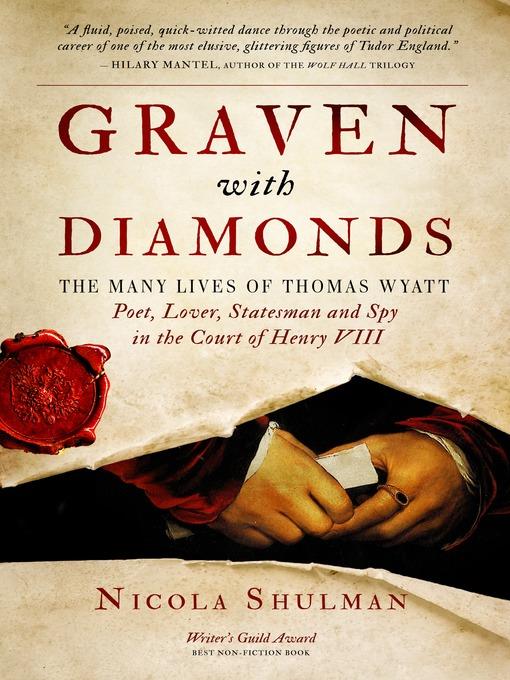
Graven With Diamonds
The Many Lives of Thomas Wyatt: Poet, Lover, Statesman, and Spy in the Court of Henry VIII
کتاب های مرتبط
- اطلاعات
- نقد و بررسی
- دیدگاه کاربران
نقد و بررسی

December 24, 2012
A distinguished courtier, probable lover of Anne Boleyn, and the first English poet to write a sonnet, Thomas Wyatt (1503–1542) was well positioned to make a name in belles lettres, as this lively biography attests. In Shulman’s (A Rage for Rock-Gardening: The Story of Reginald Farrer) assessment, the state of English verse was in sad decline in the early Tudor era, and an educated and witty poet such as Wyatt easily became a master of the poetry of courtly love. A verse form that heaved with flirtation and frustration, courtly love poetry wasn’t intended as literature (none of Wyatt’s verse was published in his lifetime) so much as a means by which courtiers and royalty communicated, gossiped, and upheld standards of chivalry. Shulman deftly interweaves close readings of Wyatt’s poems through her reconstruction of Henry VIII’s court, showing how they illuminated dalliances and intrigues and even could be read as a commentary on the Reformation after Henry severed ties with Rome. Shulman’s vivacious prose complements her scholarship. As she writes of the dearth of poetic talent in England between Chaucer and Shakespeare, “aspiring poets-and-lovers of Henry’s reign were treading the slack water between two towering waves of genius.” Her delightful book puts polish to a potentially dusty era. Agent: Caitlin McKenna, the Melanie Jackson Agency.

December 1, 2012
The author of A Rage for Rock-Gardening: The Story of Reginald Farrer (2004) returns with a nuanced look at the poetry and life of Thomas Wyatt (1503-1542). Along with just about everyone else in the court of Henry VIII, Wyatt, who brought the Petrarchan sonnet to England, had to master the intricacies of the survival dance in that era--or kneel before the chopping block. (Wyatt somehow survived--barely--his king's bloody capriciousness.) Shulman charts the choreography of Wyatt's career during the time of Henry and later. She notes that his reputation as a poet had fallen considerably, but she, among others, is effecting a restoration. She sketches the rise of the Tudors and then rehearses the biographies of the wives of Henry VIII, noting along the way the roles that Wyatt played--or didn't play--on the marital merry-go-round. Throughout, the author closely examines Wyatt's various love poems, noting that he wrote not for publication but for circulation among friends and associates. She acknowledges one severe problem: Wyatt's poems have no dates, so inference is the historian's closest companion. But Shulman, confronting her daunting task with aplomb and sensitivity, shows us how Wyatt's lyrics, subtle and layered, can refer to a deer or a woman, a hunt or a courtship. She also examines the courtly love tradition, the influence and status of Chaucer, the psychology of the king and the tangled history of the English Reformation. Readers of Hilary Mantel's two novels about Thomas Cromwell will enjoy seeing him in a different context (and--spoiler alert--will learn his fate). Shulman also reveals her own considerable lyrical chops: On Anne Boleyn: "With her wit, her dazzle, her ludic, punning Burgundian manners, she melted into his [Henry's] dream of Albion." A gracefully written, thoroughly researched story of an agile and articulate survivor.
COPYRIGHT(2012) Kirkus Reviews, ALL RIGHTS RESERVED.

January 1, 2013
If the average person knows the name of Thomas Wyatt, it's for a reason that's either risque (his rumored affair with Anne Boleyn) or literary (his contributions to English lyric poetry). The poetic exploits interest UK writer Shulman, who delves into the poems to examine their meaning, quality, and significance to Wyatt himself. The resulting work falls somewhere between biography and literary analysis, for although Shulman touches on the aspects of Wyatt's life listed in the subtitle, she is most interested in their intersection with his poetry and in the ways poetic expression and courtly love pervaded the culture and politics of the Tudor world. Shulman's observations are intriguing and her prose is entertaining, whether she's detailing Wyatt's court life or teasing out layers of meaning from his sonnets, but she tends to stretch a point or an interpretation a bit too far in order to bolster her assertions. VERDICT Shulman's vibrant style, her distinctive approach to Wyatt's poetry, and the lack of other recent works on Wyatt make this a recommended read, although it lacks the rigor necessary to make it a true definitive work on the subject.--Kathleen McCallister, Univ. of South Carolina Lib., Columbia
Copyright 2013 Library Journal, LLC Used with permission.

January 1, 2013
In this literary investigation, Shulman appraises not so much the life of Thomas Wyatt (150342), credited with importing the sonnet form into English, as the contemporary relevance of his poetry to personalities and events of the court of Henry VIII. Shulman's title, for example, comes from a poem that some literary sleuths think refers to Anne Boleyn, in whose fall Wyatt was implicated but from whose fate he escaped. Shulman explains that Wyatt's poems circulated among Henry's courtiers as currency in acting out the rituals of courtly love. Wherever these might have crossed from conventions to relationships spices Shulman's interpretations of Wyatt's verses, and Shulman suggests rather than asserts, conjectures rather than concludes, about the nature of Wyatt's connection with Boleyn. Through her perceptive interpretations of Wyatt's poems, Shulman evokes the darkening atmosphere as Henry's reign ran on. Having survived the Boleyn affair, Wyatt regained favor as a diplomat but was thrown into the tower again in the wake of the fall of Henry's chief counselor, Thomas Cromwell. Concerned with a nexus of history and literature, Shulman's sophistication will inveigle readers of both genres.(Reprinted with permission of Booklist, copyright 2013, American Library Association.)

























دیدگاه کاربران